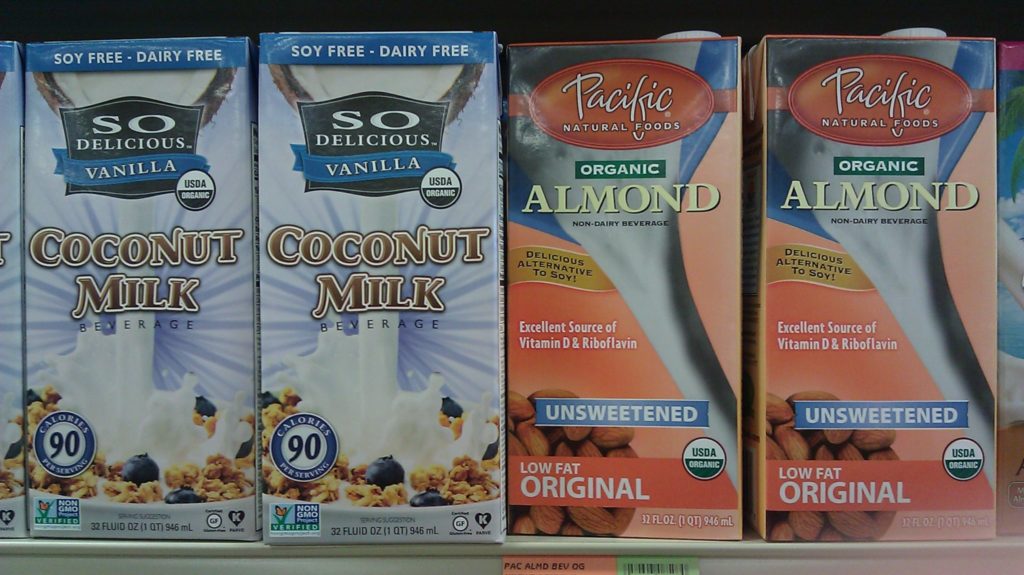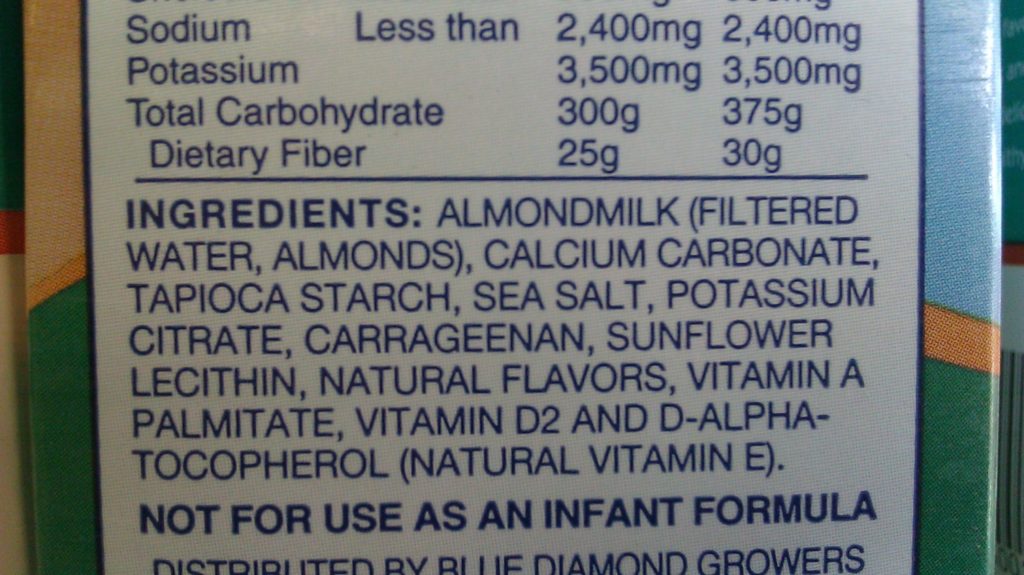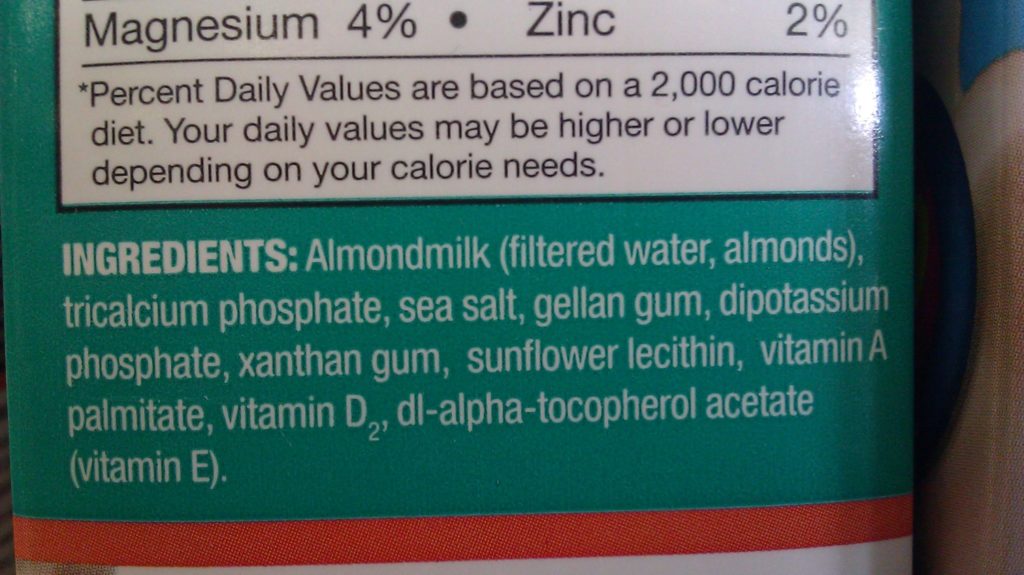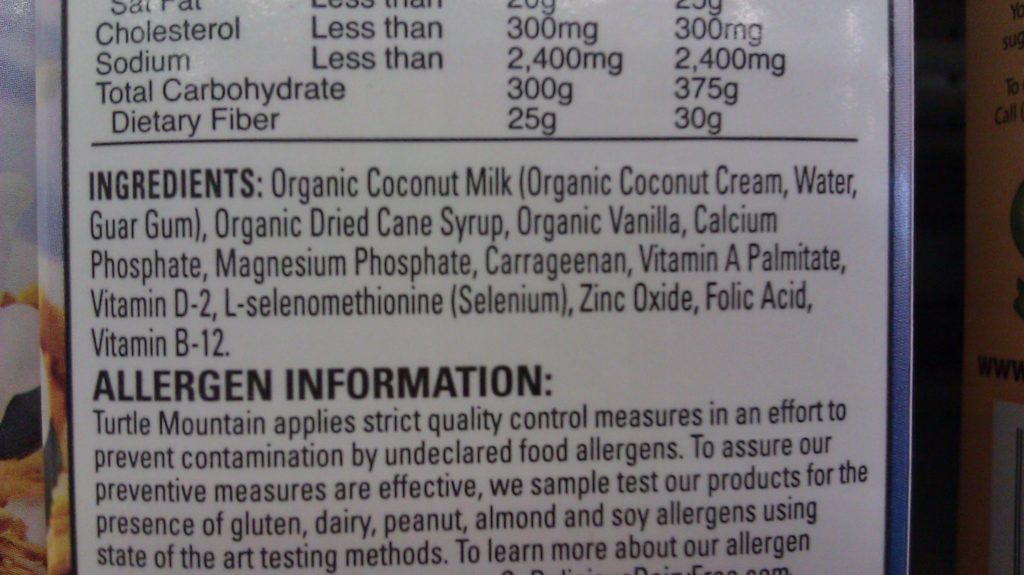 Organic coconut milk and almond milk are common purchases at the health food store by those with dairy allergies. Usually, these people are savvy consumers who know enough nutritionally to avoid soy milk with its endocrine disrupting isoflavones and gastric inflaming phytates. Rice milk is also steadily declining in popularity as it is really not much more than a glass of sugar water nutritionally speaking.
Organic coconut milk and almond milk are common purchases at the health food store by those with dairy allergies. Usually, these people are savvy consumers who know enough nutritionally to avoid soy milk with its endocrine disrupting isoflavones and gastric inflaming phytates. Rice milk is also steadily declining in popularity as it is really not much more than a glass of sugar water nutritionally speaking.
Organic, unsweetened coconut milk and almond milk in cartons seem like great alternatives at first blush, but are they really as “healthy” as people believe?
Let’s take a look at the labels. I was shocked at what I found.
Check out the labels of the three brands I photographed. I checked all the brands, by the way, and they all contained the same dangerous additives I’m about to describe.

First, Vitamin A Palmitate is added, the synthetic version of Vitamin A. I personally avoid synthetic versions of Vitamin A like the plague. Every single multi-vitamin I’ve ever examined contains some form of synthetic A, including the so called “whole foods” multis.
Synthetic vitamins are the chemical mirror images of the real, natural versions. They can cause imbalances over time. Even small amounts of the synthetic fat soluble vitamins like Vitamin A can prove toxic and should be strictly avoided!
The Organic Consumers Association warns that isolated vitamins such as those produced synthetically cannot be recognized or metabolized by the body in the same way as the natural version.

Large doses of natural vitamin A are well tolerated by the body as established by researchers decades ago, however. Traditional diets contain 10 times or more of the RDA of this nutrient with no ill effect. However, synthetic vitamin A is associated with birth defects and bone fractures. It has no benefit in the diet whatsoever.

The second really bad additive in these organic cartons of coconut milk and almond milk is Vitamin D2. Vitamin D2 is a form of the wonder vitamin that you should take great pains to avoid.
In all known cases of Vitamin D toxicity where the dose was intentional, Vitamin D2 was the culprit. By comparison, Vitamin D3 is much less toxic and requires an enormous or even an accidental dose to produce any toxic effect.
Vitamin D2 is manufactured industrially by irradiating yeast. It is dangerous for D2 to be added to any food product particularly if this product would be given to children, where toxicity symptoms would appear at much lower dosages.
None of the store brands of cartoned coconut milk or almond milk were free of these dangerous and synthetic versions of the fat soluble vitamins!
Notice also that carrageenan is present in 2 of the 3 products as well! Dr. Andrew Weil has been telling people to avoid carrageenan since 2002.
Carrageenan is so toxic and inflaming to the human digestive system that this food additive is formally classified by the International Agency for Research on Cancer (part of the World Health Organization) as a potential human carcinogen.
In my view, it would be a mistake to purchase and consume these items. They are in no way health promoting or beneficial, particularly for growing children!
Healthy Alternatives to Coconut Milk and Almond Milk in Cartons
Coconut milk and almond milk should be healthy and they can be if they are produced at home without these dangerous additives. I wrote an in depth post on how to easily make these nondairy beverages yourself. This recipe for wild rice milk is a good option as well.
Believe it or not, even organic coconut milk in BPA free cans would be a better alternative to cartons of coconut milk based on my label inspection!
Check out my video on homemade coconut milk and my article on how to make healthy DIY almond milk, fermented to add probiotics and enzymes to boost immunity and improve digestion.
Sarah, The Healthy Home Economist
Sources
From Seafood to Sunshine: A New Understanding of Vitamin D Safety








I just called So Delicious. Their coconut milk is organic and contains NO SYNTHETIC VITAMINS and the Vitamin D is not D2 I believe….it just says Vitamin D. The consumer relations gal is checking with their scientist to confirm on the Vitamin D and will let me know. I feel bad for all those who read this article who thought they could no longer have their cartoned coconut milk. So Delicious IS O.K.
I did find out many good things from reading both the article and ALL the comments. Thank you! As a 4 decades plus vegetarian in excellent health who looks quite a bit younger than my birth-age, I do wish you would just “agree to disagree” with us veggies and hold back on the sniping. Appreciatively, kanta
I just like the helpful information you supply to your articles. I will bookmark your weblog and test again here frequently. I’m somewhat certain I will be told plenty of new stuff right here! Good luck for the following!
So if I’ve understood correctly, almond milk itself is good but when commercially packaged check the other ingredients which may not be.
What you’re describing is not the case in every country. For example, in Canada, the brand of coconut milk you’re showing in the photo has no vitamin supplementation whatsoever. Many “Canadian” version of US products do not because we have stricter food additive laws when it comes to vitamins and minerals (for example, manufacturers are not allowed to fortify ANYTHING with vitamin K!). It doesn’t stop the carrageenan, however, but I thought you’d be interested to know that.
could you give us the names of the products and their website to see if we can get it here in the US? maybe they sell them thru Amazon? Thanks
I broke down how much it costs to make my own almond milk with 5 lbs of store bought bulk Raw Organic Whole Shelled Almond (ROWSA) and here’s what I got:
– 1 lbs = 3 cups. (That’s a conservative figure); 5 lbs = 15 cups
– I make a single batch with 1 cup of ROWSA at the time and get 6 cups of almond milk using this recipe:
1 cup almonds, soaked and rinsed (Overnight in Fridge – Follow Janet’s advice)
2.5 Tsp Maple syrup
6 cups water (you may use only 5 for thicker milk)
Pinch sea salt
1 tbs vanilla extract (optional)
Blend almond with only 2 cups of water to produce fine almond meal. Then filter with Cheesecloth or create your own filter bag made of fine fabric.
– This makes 90 cups of almond milk;
– There’s 45 pints in 90 cups;
– Each store bought almond milk cartons is 2 pints; 45 pints/2 = 22.5 cartons
– So you’ll need to buy 22.5 cartons at $3.00 (Also a conservative figure) to get the same quantity of homemade almond milk; 22.5 cartons @ $3.00 = $67.50
– The cost of 5 lbs of ROWSA is $37.50 (I get mine online at Azurestandard.com)
– Even at $10.00/lbs ($50) it’s still a good and clean deal! No Carrageenan, additive of all sort and waste…speaking of which HERE’S ONE DELICIOUS WAY TO USE YOUR ALMOND MEAL (I dry mine in a toaster oven @ 175 F for 25 minutes moving the meal around every 10 min.):
DRY INGREDIENTS:
-3 cups (450g) of almond meal
-2 tsps baking soda
-1/2 tsp salt
WET INGREDIENTS:
-1/4 cup (60ml) coconut oil melted
-4 large eggs
-2 very ripe bananas, mashed
-3 tsps vanilla
-3 tsps cinnamon
-1/2 cup (50g) of walnut, chopped
-1/2 cup of carob chips (optional)
1. Preheat oven to 350C(175F)
2. Combine DRY INGREDIENTS in a small bowl
3. In separate bowl mix together coconut oil and eggs
4. Mix the flour combination into oil and eggs, stir until well blended.
5. Add mashed bananas, vanilla and cinnamon. Fold in walnuts and carob chips.
6. Pour batter into a greased loaf pan. Bake for 25-30 min. or until a toothpick comes out clean.
Enjoy!